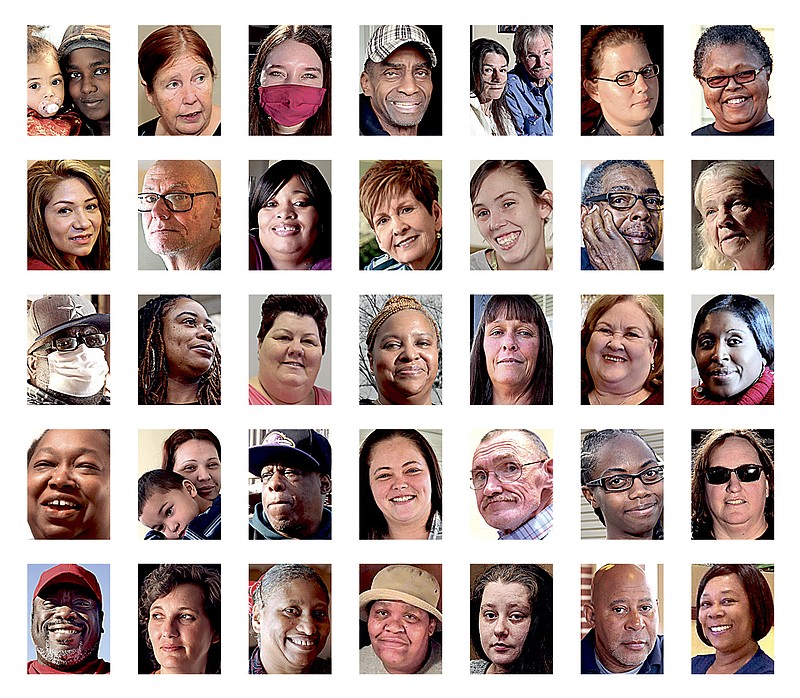For more than a century, Chattanoogans and their daily newspaper have teamed up to help those in the community who have fallen on hard times.
One of the earliest listings of "Neediest Cases" appeared in December 1919 when 63 cases were reported "by responsible agencies," which at the time included the Red Cross, Salvation Army and Associated Charities. The Chattanooga Times' effort had been underway for "several years," newspaper archives show.
"The little biographies herewith bring a message to Chattanoogans which, we are confident, will not be ignored," the article in the Dec. 14, 1919, edition of the Chattanooga Sunday Times reads, "To the people whose simple stories are told on this page, your gift will mean more than something to amuse for a moment and then be cast away. To many of them, it will mean the humble comforts of life. To gladden the heart of a child with a plaything is a pleasure; but to save a mother - anybody's mother - from want is both a pleasure and an obligation."
The campaign in Chattanooga began after the Times' then-publisher, Adolph Ochs, on an after-dinner walk on Christmas Day 1911 encountered a man with no place to sleep for the night, according to historical information from the United Way of Chattanooga, which oversees the fund now.
(Donate to the Neediest Cases Fund here)
Ochs gave the man a little money and told him to come see him the next day if he needed a job. The experience sparked an idea to use the newspaper as a way to tell stories of people in need so readers could help.
Since then, the Chattanooga Times Free Press and its earlier incarnations have facilitated the Neediest Cases every holiday season, and while the stories have changed, the purpose of the fund hasn't.
(READ MORE: COVID-19 bouts set family back, and Neediest Cases aid will make a better 2022)
The cases in 1919, all listed under fictitious names, speak of trials echoed by some in today's Neediest Cases, among them military veterans of World War I, archives from 1919 show.
"Henry Gray, a Chateau-Thierry hero, was sent to Chattanooga by federal board for vocational training. Bride of six months with him, man's health not very good and unable to keep constantly employed. It should be a real privilege to provide a Christmas basket for this family," reads one entry of case notes from the Red Cross.
"John Hill, soldier, served fourteen years in the army while on the Mexican border," another reads. "Only means of support, compensation from government. Wife in poor health. Family find[s] it difficult to make ends meet. A bit of Christmas cheer from someone would be helpful."
Some case circumstances are spelled out with disturbing, unvarnished clarity.
"Annie Vincent has three children, 6, 3 and 1. Husband absolutely worthless and does not give family any support," one case entry reads. "Baby has been ill for months which renders mother unable to go out to work. Husband has been arrested and every means has been used to make him support family but he will not. Family has absolutely nothing to live on except what is given by Red Cross. Need coal, groceries and clothing."
Some are the cases of the aged and lonely.
"Just a few days ago a feeble voice called over the phone and said, 'The governor is coming, won't you please see him for me?'" a Salvation Army entry reads. "You don't know what she wanted but it would make your heart ache to hear of the heartaches this little old woman has had. She has no one to help her, is not able to do heavy work and some of the time is not able to work at all. Mrs. Perry needs coal, a Christmas dinner and worlds of cheer to brighten her dark hours."
(READ MORE: Opinion: When life throws curveballs, Neediest Cases is here to help)
Racial lines were drawn starkly but charity knows no lines.
"John Carter died four years ago, leaving a wife and seven children," one entry reads. "Mollie has struggled hard. She soon found that she could not care for all the children, so different members of the family have taken four of them. The two oldest, William and Mary, 2 and 10, and John, age 5, live with the mother.
"Will worked till time for school to begin. He was earning $5 per week; Mollie earned the same," the entry continues. "Mary must have glasses. If ever a colored woman has tried hard to take care of her own, Mollie has done so. A ton of coal and glasses for Mary are the greatest needs just now."
Nowadays, the help is just as needed, United Way of Greater Chattanooga stability support specialist Pat Strange said.
"Neediest Cases Fund recipients are typically individuals or families who have been employed or on fixed incomes and have experienced an unforeseen situation that has disrupted their lives and placed a burden on their financial well-being," Strange said Tuesday in an email.
It's a need that never goes away.
"The last two pandemic years have changed so many lives - whether due to illness, loss of family members, loss of or reduced employment, loss of child care, etc.," Strange said. "Contributions to Neediest Cases can provide hope and encouragement to those who have suffered setbacks through no fault of their own."
Contributions to the Neediest Cases Fund will be accepted until Dec. 31.
Contact Ben Benton at bbenton@timesfreepress.com or 423-757-6569. Follow him on Twitter @BenBenton.
